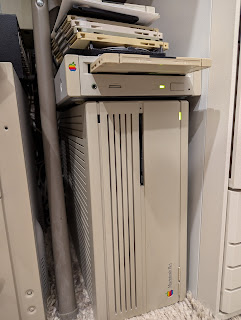For those of you unfamiliar with the general world of Lisp machines, they are, as their name implies, workstations entirely designed around the Lisp programming language. That doesn't just mean using conventional processors with a Lisp runtime either: these devices are built to run Lisp from the silicon up with specific hardware support. (Some of these systems could also run Prolog, my personal favourite AI-adjacent language. We'll play with a surprising small Prolog implementation in a future article.) They existed in highly technical environments as workhorses of the first wave of AI hysteria (you crazy kids today with your LLMs) for applications like natural language processing and expert systems. The genre more-or-less flourished from the end of the 1970s to the early 1990s and included some of the first systems to implement advances like bitmapped displays, networking and pointer devices. In turn, those unusual capabilities caused them to also develop distinctive user interfaces for their unique feature set, years before today's GUI and keyboard conventions we almost unconsciously take for granted were even conceived of. Working with a Lisp machine can be a remarkably different user experience from modern computing and the occasionally jarring nature of those differences isn't something present-day emulators fully capture.
Unfortunately, their rarity also makes them the whitest of white elephants sometimes. Besides what I had to do to get it working properly to start with, the hard drive started timing out and it randomly froze during boot or shortly afterwards. (There was also the matter of me never finishing its setup, let alone getting it networked.) I'm not letting this benighted thing die on me after all I've put into it — it's time for a Refurb Weekend.
